As portrayed in the Tom Hanks-led film Captain Phillips, Abduwali Muse and three other Somali pirates hijacked the Maersk Alabama and kidnapped its captain. But Muse’s story was far more complicated than it appeared onscreen.
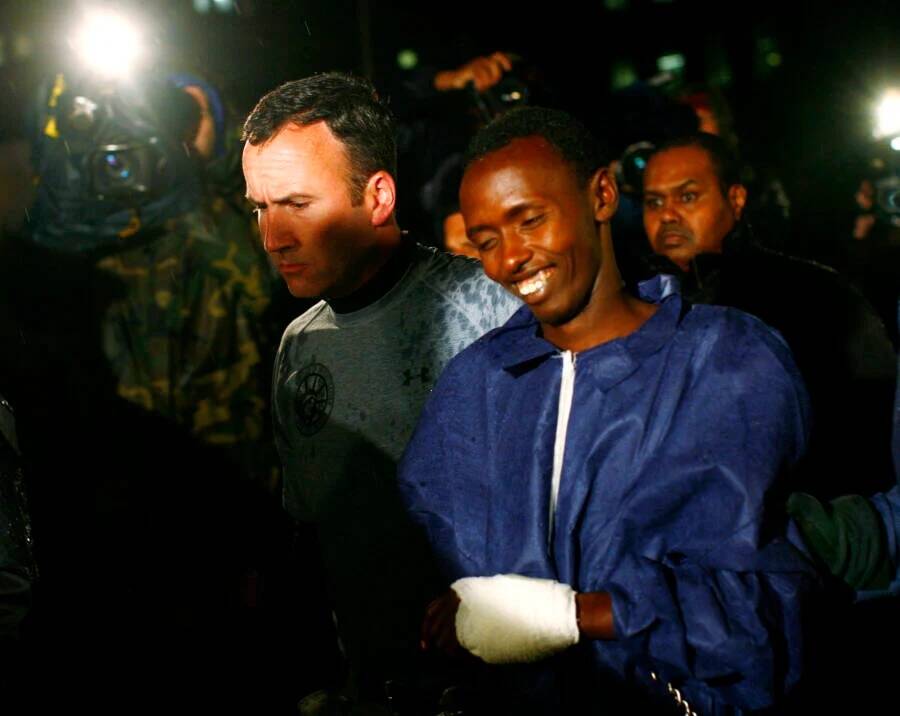
Stephen Chernin/Getty ImagesAbduwali Muse was just a teenager when he boarded the Maersk Alabama and took its captain, Richard Phillips, hostage.
Abduwali Muse’s life took a dramatic turn from the impoverished streets of Somalia to the global stage when, in April 2009, he became the face of modern piracy.
That month, Muse became internationally known as the sole surviving pirate from the group that hijacked the MV Maersk Alabama — a cargo ship flying the American flag — and kidnapped its captain, Richard Phillips.
This story would later inspire the film Captain Phillips, in which Muse was portrayed by Barkhad Abdi, who delivered the film’s most famous line: “Look at me. I am the captain now.”
Muse was sentenced to 33 years in prison, where he claims to have suffered poor treatment. He has rarely spoken about the Captain Phillips incident, leaving much of his story in the hands of the real Captain Phillips — an account that former Maersk Alabama crew members have since discredited as being self-inflammatory and missing key details.
So, who is the real Abduwali Muse?
Abduwali Muse’s Life Before The Maersk Alabama Shipjacking
Since Abduwali Muse has remained relatively vague about his past, much of what is known comes from what investigators were able to glean following the kidnapping of Captain Richard Phillips.
Investigators stated that Muse was 18 at the time of his arrest. However, both of his parents contested this. Muse’s mother, Adar Abdurahman Hassan, told the BBC that her son was just 16 years old, and his father later claimed he was 15.
If either of Muse’s parents are to be believed, he would have been underage at the time of the kidnapping.
What can be confirmed is that Abduwali Muse grew up in Galkayo, Somalia. A divided city, Galkayo is split in two parts. The northern half is controlled by the Puntland State of Somalia, and the southern half by the Galmudug State of Somalia.

theodore liasi / Alamy Stock PhotoLocals working at a Galkayo market in Somalia circa 2006.
This division of control often resulted in conflict, particularly when it came to infrastructure projects in the disputed areas.
This was the environment that Abduwali Muse grew up in. He allegedly came from a poor family and had little to call his own. In court documents quoted in a 2018 Daily Beast article, Muse’s lawyers would later say that, as a child, he survived “primarily on camel’s milk, although sometimes he had fruit or nuts. About once a month, he might be given a cooked meal… When his father was particularly upset, he would tie Abduwali to a tree and tell him that a lion would come to eat him.”
According to these accounts, it was this life of poverty that ultimately drove Muse to piracy — and the infamous kidnapping of Captain Phillips.
The Real Captain Phillips Story
On April 8, 2009, the Maersk Alabama, a U.S.-flagged cargo ship carrying humanitarian aid to Kenya, was hijacked by Somali pirates approximately 240 nautical miles southeast of the Somali city of Eyl. It was the first successful pirate seizure of a ship registered under the American flag since the early 19th century.
The ship’s captain, Richard Phillips, had reportedly been made aware of the dangers of these waters but declined to alter the ship’s course.
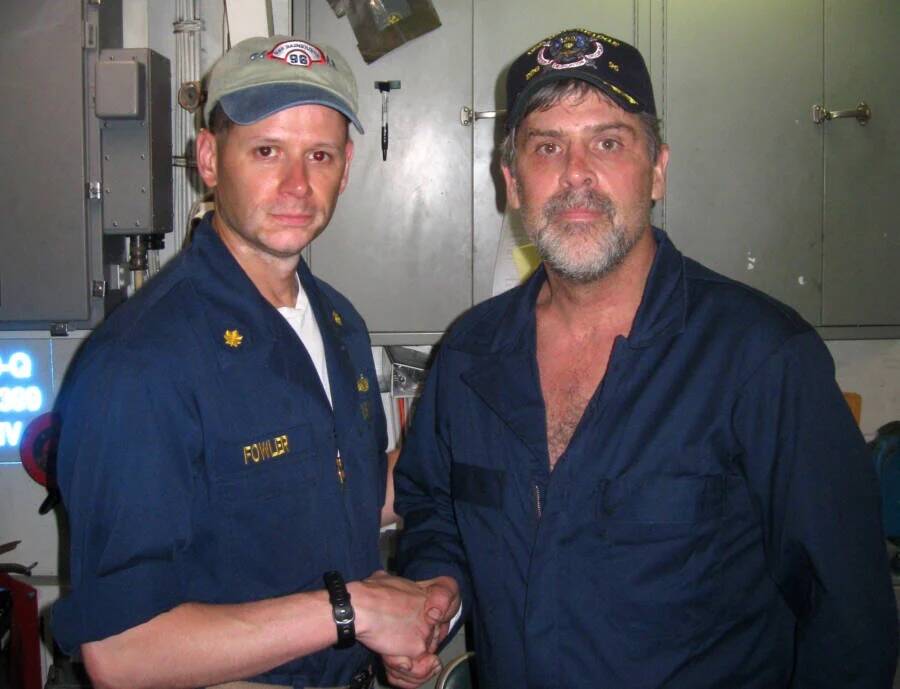
Wikimedia CommonsThe real Captain Phillips (right) has been accused of falsely portraying the events surrounding the 2009 hijacking.
When the ship was besieged by AK-47-wielding pirates on that April morning, there was little the unarmed crew could do to fight them off. They attempted to fire flares to keep the pirates at bay, but eventually the four pirates made it on board. The first of these was Abduwali Muse, whom Phillips later claimed presented himself as the leader of the group.
Most of the crew managed to flee to the ship’s fortified steering room. But Phillips was not among them. While he tried to negotiate with the pirates, Chief Engineer Mike Perry managed to shut the ship down, effectively preventing the pirates from taking control of it.
At one point during the tense encounter, Muse left Captain Phillips and other captured crew members with the other pirates to search below deck. There, Muse was ambushed by Perry, who took him captive and attempted to make an exchange of hostages: Muse for Phillips.
But when Perry released Muse, the pirates refused to release Phillips as promised, instead taking him aboard a lifeboat. Abduwali Muse managed to escape with them.
Now, the pirates were demanding a ransom for the safe release of Captain Phillips.
The Kidnapping Of Captain Phillips
The hostage situation drew international attention — and an immediate response from the U.S. military.
The U.S. Navy, led by the destroyer USS Bainbridge, arrived on the scene to begin negotiations for Captain Phillips’ safe return.
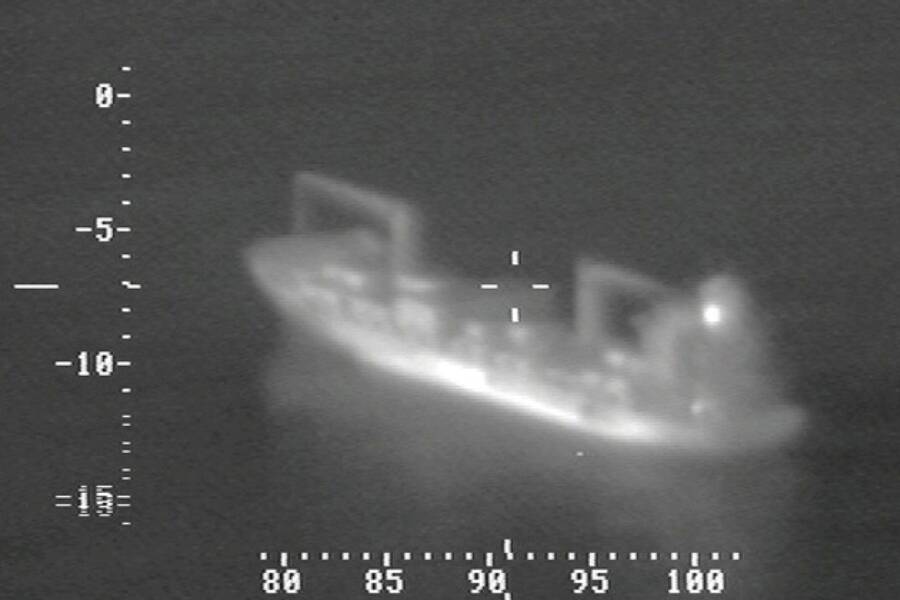
Wikimedia CommonsThe Maersk Alabama as seen in aerial footage.
The standoff dragged on for four days as negotiations between the pirates and the U.S. Navy proved fruitless, with the pirates demanding a ransom of $2 million for Phillips’ release.
During this time, Phillips claimed Muse psychologically tortured him on the lifeboat, “spitting, cussing, belittling me” and laughing as he threatened to kill him.
The ordeal finally ended when U.S. Navy SEAL snipers positioned on the USS Bainbridge took aim at the lifeboat. Taking advantage of a brief window of opportunity when the pirates exposed themselves, the snipers simultaneously fired, killing three of the pirates and ensuring no harm came to Captain Phillips.
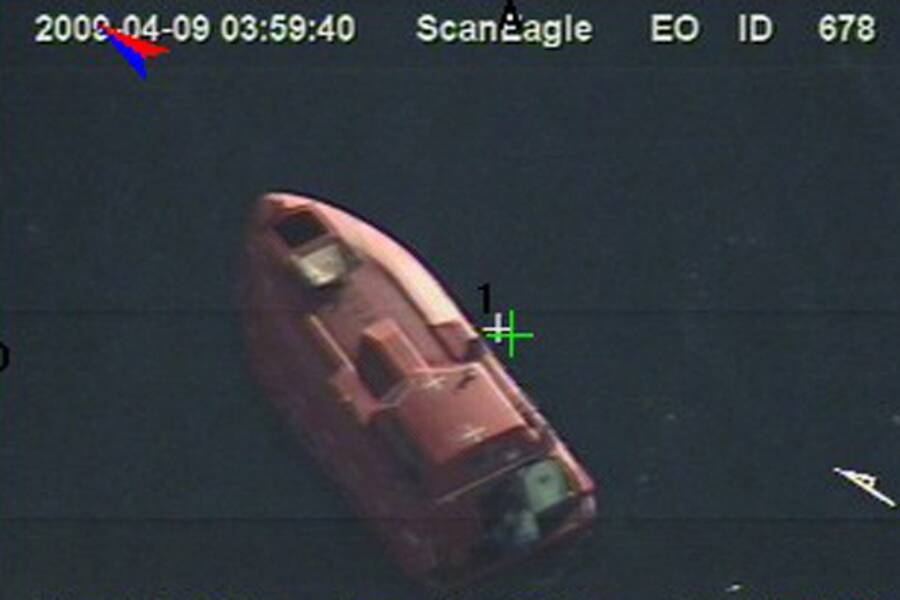
Wikimedia CommonsAerial footage of the lifeboat where Captain Phillips was being held.
But Abduwali Muse, who had conveniently already boarded the Navy vessel to negotiate Phillips’ release, survived. He was taken into custody immediately following the operation.
The Case Against Abduwali Muse
Abduwali Muse became the subject of much public fascination when photos of his perp walk showed him grinning broadly, apparently unfazed by the circumstances in which he found himself.
The United States had not had a legal case involving piracy in years. So when it came to charging Muse, there was little modern precedent for how to proceed.
He was arraigned in a federal court in New York in 2009, shortly after his capture. He faced multiple charges, including piracy under the law of nations, seizing a ship by force, kidnapping, and hostage-taking.
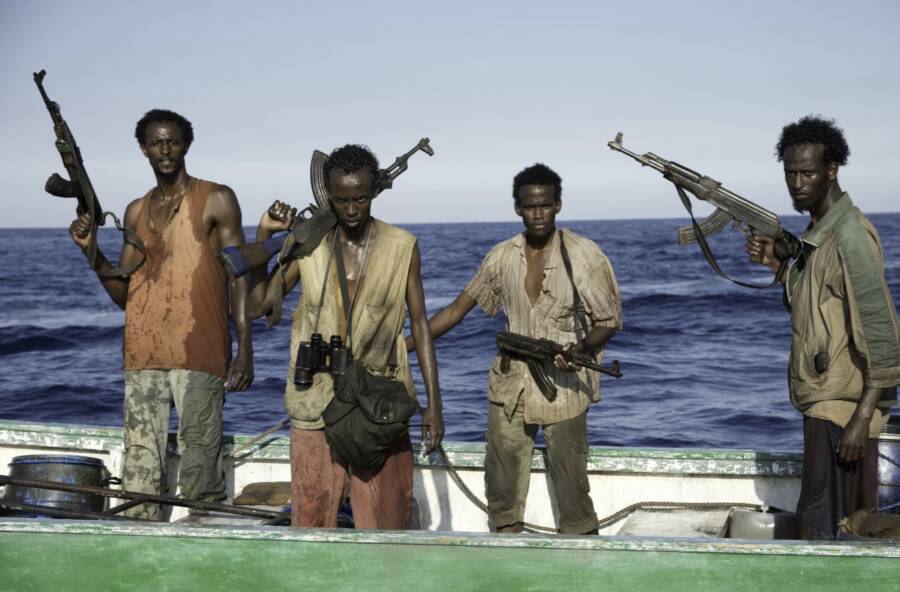
Columbia PicturesFaysal Ahmed, Barkhad Abdi, Barkhad Abdirahman, and Mahat M. Ali in Captain Phillips.
There was another issue, though. No one was quite sure how old Muse actually was. According to his parents, he was a minor at the time of the incident. But the court ultimately made the decision to try him as an adult after Muse apologized for being untruthful and said he was “between 18 and 19,” according to The New York Times.
Still, the defense argued that Muse was a victim of his circumstances, coerced into a life of piracy by people more powerful than him.
“I want everyone to understand that my boy was tricked by these bandits,” Muse’s father said in his son’s defense. “If they do an investigation, they will see he was tricked into making this decision by someone who was older than him… He was not in his right mind. Somebody tricked him.”
Richard Phillips painted a different picture of Abduwali Muse, however.
Throughout the trial, the prosecution cast Muse as cruel and sadistic. They claimed that Muse touted himself as the pirate gang’s leader. According to ABC News, Phillips went so far as to call Muse a “terrorist” who took pleasure in terrorizing his captives.

Columbia PicturesAbduwali Muse reportedly never said Captain Phillips’ most famous line, “Look at me. I am the captain now.” The line was adlibbed by Barkhad Abdi, the actor who played Muse in the film.
Abduwali Muse’s Life In Prison
In May 2010, Abduwali Muse pleaded guilty to hijacking, kidnapping, and hostage-taking, avoiding a more complicated trial that would have delved deeper into the details of the piracy incident. In February 2011, Muse was sentenced to 33 years and 9 months in prison.
The sentencing took into account his guilty plea, the serious nature of his crimes, and the need for a strong deterrent against future acts of piracy. The judge acknowledged Muse’s desperate circumstances but underscored the necessity of a significant penalty for acts that threaten international shipping and safety.
Since then, Muse has rarely spoken about the incident. However, he made headlines again in 2018 when he filed a $1.15 million lawsuit against a prison dentist and two other medical personnel for “deliberate indifference” to his dental needs, which he claims resulted in him losing 15 of his 32 teeth. He has described his pain as “unbearable” and said he no longer can “properly chew, eat, or consume vital nutrients.”
Muse also complained in prison letters of growing depressed during his incarceration and that he’d been held in solitary confinement during his first year in prison. He claimed to suffer from PTSD from the horrors he witnessed during his brief stint as a pirate.
Phillips, meanwhile, said he had “no ill will” toward Muse, as he likely did what he felt he needed to do in order to escape his circumstances.
“Somalia is a lawless country,” said Phillips. “Muse was working for the warlords up north. The only thing that’s going to get rid of piracy, which starts on land and then reaches out to sea, is to do something about that lawlessness.”
But until Abduwali Muse has the opportunity to share his own story, we may never know the full truth of the Smiling Pirate.
After reading about Abduwali Muse, the pirate from the real Captain Phillips story, dive into the bloody history of the Jolly Roger. Then, discover the harsh truths behind 11 other movies based on historical events.





